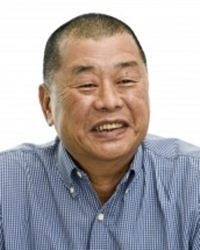Everyone in the global fight for liberty has some item that cultivated his intellectual palate. For Chinese dissident Jimmy Lai, it was a candy bar.
As an eight-year-old boy, he worked as a baggage carrier in a railway station in his native mainland China. After he carried the bag of a visitor from Hong Kong, the man gave the future billionaire a piece of chocolate. “It was amazing,” he says. Eating that delectable sweet made him believe “Hong Kong must be Heaven, because I’ve never tasted anything like that.” One bite of that confection gave him a taste for freedom.
At the age of 12, he sailed off – alone – to Hong Kong, hidden in the bottom of a fishing junket. “In the morning, I smelled a lot of food that I never smelled, the great aroma of food,” Lai remembers. “It was as if I arrived in Heaven.” Waking up in that bustling land of opportunity, surrounded by the abundance that economic freedom facilitates, “I knew I had a future.”
Lai’s prowess in the fashion industry turned him into a billionaire. But at the time when most people would concentrate on how to enjoy their wealth, he felt his homeland calling. On June 4, 1989, no one could block out the sound, as Chinese tanks crushed peaceful protesters in Tiananmen Square. The assault struck a deeply personal chord with Lai. “It’s like my mother was calling,” he says, “and my heart opened up.”
Lai used his fortune to begin publishing the Apple Daily. Its honest coverage of Beijing made the newspaper one of the most popular in Hong Kong. Lai says his vocation as an entrepreneur compelled him to spread liberty through the printed word. “In the media business, you deliver information, then you deliver choice, and choice is freedom,” he says.
His activities soon caught the attention of the Chinese Communist Party. After China’s aggressive (read: illegal) combination of industrial insourcing and global exports drove decades of double-digit GDP growth, the world’s newest economic powerhouse suppressed internal dissent through increasingly violent means. Soon, the CCP turned its eyes on Lai’s honest publication.
Lai’s love of freedom landed him in government confinement. More than 200 police officers stormed the offices of Lai’s newspaper on August 10 to arrest him and two of his sons for violating China’s draconian new “national security law.” Lai already faced five years’ imprisonment for trumped-up charges of intimidating a reporter. He was acquitted of that case in September, but the possibility of a longer prison term looms over the 71 year old.
Lai, who owns numerous mansions around the world, could have fled Hong Kong at the first sign of trouble. He has instead committed himself to fighting for freedom of speech, freedom of assembly, and the right to speak truth to power. His godfather, Wall Street Journal editorial board member William McGurn, has called Lai “Hong Kong’s Thomas More.”


